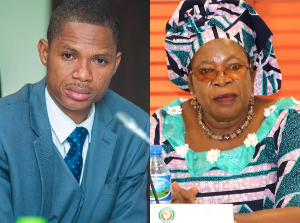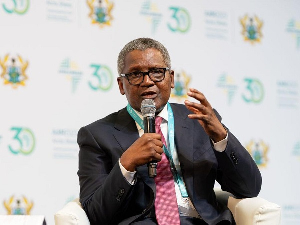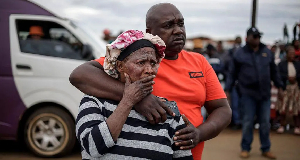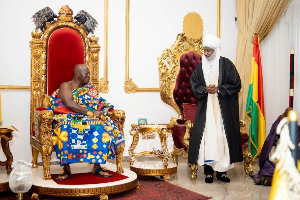And do these donors mean it well for us at all?
After hesitating for some months, I now feel I must contribute to the current debate on the water privatisation process in Ghana. I implore the NPP government to listen to the opinions from the civil society and other stakeholders not only the donors.
My contribution will centre on the role of the so-called donors, who are behind this policy. The question we need to ask ourselves is, do we really have to take the advice of these donors? Are we not giving them too much power in the administration of our national economies, which they continue to ruin?
My position is that these donors use their ‘peanut financial grants’ to lure us to implement policies, which are in their best interest and which can be termed as detrimental to our progress. These donors contribute so little financially and yet are able to steer our economic, social and political directions with their conditions. As one commentator wrote “… the World Bank and IMF hold the purse strings, so they can dictate what a cash-strapped government signs up to in exchange for loans…’.
Let us look at the financial assistance of three major donors: the IMF; the World Bank and the EU. This will highlight my contention that ‘financial peanut buys major policy interference’
In the IMF/World bank documents on Ghana available at www.servicesforall.org/html/countries/ghana.shtml, they have agreed to grant us loans and financial assistance of maximum US$640 million over a period of 3years when we ‘behave well’. The ‘good behaviour’ means the privatisation of the urban water and electricity companies as well as allowing private companies (read multinationals) to be part of our cocoa export trade. Now all these conditions are not meant to inject the much needed financial investment into the country to create jobs but is rather geared towards paving the way for foreign companies to reap profits at our expense in the guise of participating in the global economy.
The water privatisation issue has already received some analysis e.g. the International Fact-Finding Mission Report (see http://www.citizen.org/documents/factfindingmissionGhana.pdf), so let us sidetrack a bit and consider the liberalisation of the cocoa export trade.
What benefits will these foreign companies bring to Ghana when they are allowed to export 30% of our cocoa? In this global market economy, a few oligopolistic companies dominate the commodity market and decide on the prices of commodities in advance. These few companies are so powerful that you need strong ‘organised sellers’ if one is to have some influence over the price.
In the current set up, at least farmers are assured of their price even if the world market tumble. There is however the negative side (when world prices go up) which needs to be corrected.
At the moment the COCOBOD is not performing at its optimum and many farmers are not paid on time, and many areas have been left without infrastructure like roads to cart the cocoa products. However, we can see that after the Government has allowed some Licence buying agencies to enter the purchasing trade few of them have put up even sheds for the cocoa beans they buy. Few give any support at all to the farmers and the scales are ‘adjusted to falsify the real weights’. Many of the buying agencies have even collapsed leaving some farmers unpaid.
When Ghana allows private companies to export our cocoa, the following repercussions will arise.
- 1. If local companies are involved in the export, they would be competing among themselves and not have the concerted effort and therefore will lack the leverage to influence the negotiating agenda on price setting. Their bargaining power will be divided and they will never have any impact on the international negotiations This will have adverse effects on Ghana’s economy and the cocoa farmers.
2. When foreign companies get involved (which is what is behind the IMF and world bank policy) part of the foreign currency earned in the export will be held by these companies abroad and will not come to Ghana. Secondly, any gains due to the increase of world prices will not get into the national coffers but in the pockets of these private companies.
3. Also by controlling the export trade, Ghana can sell upfront and generate about US$500million even before the harvest. This situation helps the country in their foreign exchange flow and helps planning. A foreign debt stranded country with limited forex reserves will lose such an important instrument. Although one should be sad about the neglect of farmers and the Cocoa Ministry (this is illustrated among them, the deplorable state of the Cocoa House building in the centre of Accra) by the previous regimes, this is another matter.
4. In any case, and the most important of all, allowing competitors in the cocoa buying and export business will mean eliminating the ‘guaranteed prices’ given by Government to cocoa farmers. This will mean allowing market forces to reign and our farmers will never know how much they will earn in advance for the buyers will never buy it at a higher price when the prices fall on the world market. Even at stable market prices, they will never pay more since their objective is to make profit.
Therefore the question again is what do we benefit from this IMF/World Bank condition or policy when implemented? The answer is just simple: allowing foreign companies to reap profits at Ghana’s expense.
Now, let us look at the financial flows from these bodies if we implement their policies:
In total, we will have a grant and loan assistance of $640m over three years from the IMF/World Bank. This is the higher scenario i.e. when all given conditions are implemented. This means on the average $200m per year. The foreign currency outflows when those policies are implemented far outweighs those gains and yet we will have a damaged economy, jobs will be lost and our current account balance will be in the red. Mind you, some of those funds need to be paid back, and our debt burden increases. Please lets get serious.
Now, the European Union. The recently approved agreement between Ghana and the European Union (EU) in August 2002, states that the EU will grant Ghana an amount of 311 million Euros over a period of 5 years. The heading in the Ghanaian papers failed to capture the 5 year period 2003-2007 and also the terms or conditions of the agreement. The funding agreement states that 231million Euros will be allocated for development projects and the 80million Euros for unforeseen needs like a fall in export earnings, budget deficits or emergency situations. A closer analysis of the funding contract termed ‘Country strategy Paper and Indicative Programme’ ( see http://europa.eu.int/comm/development/strat_papers/index_fr.htm)? indicates the following disbursements per year:
| 2003 | 2004 | 2005 | 2006 | 2007 | total |
| 21 million Euros | 44 million Euros | 67 million Euros | 62 million Euros | 31 million Euros | 225 million Euros |
( The remaining 6m Euros for reviews and evaluations)
Looking at a HIPC country like Ghana, with 18million people and 40% of the population living under the poverty threshold, what can 45millon Euros per Annum do? In comparison, Ghanaians in Diaspora send about US$ 400million per year. What is sad is that this EU financial assistance will not come without conditions (economic, social and political), Let us look at some of these:
On page 7 of the strategic document we can read the following:
- ‘…. The Country Support Strategy (CSS) for Ghana for the period 2002-2007 reflects the general principle of the Cotonou Agreement, It takes into account the country’s Interim Poverty Reduction Strategy Paper (PRSP) for 2002-2004 which will be developed into a full strategy paper, The CSS will be adapted as necessary as the PRSP process moves forward….
…. In all sectors, co-or parallel financing with other donors, specifically EU Member States and the Bretton Woods Institutions will be considered….’
Under the terms of the Cotonou Agreement, the EU is grouping the ACP countries into its own regional trading blocks and seeks to have after 2008, what it calls Regional Economic Partnership Agreements REPAs. The negotiations for the establishment of these economic partnership agreements are scheduled to begin at the end of September 2002. What these moves towards EPAs will mean is that the countries, which until now have enjoyed non-reciprocal trade preferences with the EU will have to start introducing free trade with the EU from 2008, with a full free trade area being in place by 2018. This will involve progressively opening the Ghanaian market to duty free imports from the EU on most of what the EU currently exports (80 to 90% of currently traded goods). As the price of imported goods falls this will mean that more and more EU goods will enter the Ghanaian market. This duty free access will have important implications for Government revenue from customs duties and also local production.
What is clear is that after saturating the markets in the north with their well-established industries, the EU and other big multinationals are looking for markets for their goods.
The EU is also forcing on Ghana, to comply with the Bretton Woods Institutions’ conditions, which include privatisation of water and electricity, and liberalisation of the Cocoa trade. This is why a big chunk of the grant is pushed beyond 2003 when the compliance with baskets of the conditions with the IMF and World Bank can be evaluated.
Are we not surrounding our economic and development policies to the whims of these donors for peanuts?
Now to remind us, these donors do not have the development of our countries at heart. They are out to implement what analysts call the Washington Consensus. The fundamental purposes of the consensus are to assure the security and mobility of capital of the multinationals. Among the components are:
- 1. “Taming inflation to safeguard the value of investments by measures, such as budget austerity; privatisation and reductions in the civil service;
2. Pursuing an export-oriented strategy which can earn foreign currency to import goods and services and service debt; and
3. Ensuring capital mobility so that speculators and investors can freely enter or exit a country with minimal risk”
From this consensus they have added some ‘Ice to the cake’ and that is the Poverty Reduction Strategic Papers (PRSP), which they claim will give some ‘ownership’ of the policies to Southern countries even though they still send their experts and also a 1000 page Sourcebook to tell developing country groups how to create PRSP.
We therefore need to be careful in the implementation of the policies of these Institutions after all, Ghana moved from ‘a success story in Africa ’ to Highly Indebted Poor Country within a short space of time. Some of the reasons are as follows:
One can partly blame these same Institutions for socio-economic problems unfolding currently in Zimbabwe. I do not support the current political polarization and the ‘hijacking for political gains’, of the needed land reform process, but one cannot deny the fact that these Institutions played an adverse role in Zimbabwe. How does one explain this? Zimbabwe was coerced to implement IMF and World Bank policies from the late 1980s. Before those policies, companies in the country and the economy were in fine shape. Zimbabwe then and even now has low foreign debt burden, Due to the free market doctrine, which removes subsidies and other incentives for producers, the Zimbabwean Government was ill advised to adopt this doctrine. Evidence (see ‘An alternative view on ESAP from ZCTU’) shows that jobs were lost due to massive retrenchments and the closing down of many companies. Income earners in the industry and urban dwellers began to criticise the Government and it lost support in the urban areas. This situation saw the rise for the first time of a strong opposition, which emerged from workers movement. To win back its support base for the then impending parliamentary and presidential elections, President Mugabe turned to the land issue, which was a major concern for its rural population. The rest of the story is history.
If those Institutions are not out to implement the Washington consensus, why are they wooing Botswana, a country of 1,5 million people with more than US$ 6 Billion in reserves? After all the country has no balance of payment problems. The answer is simple: they want to open the country for multi-nationals.
Products in the north are not finding markets anymore due to over saturation. Also, in their diversifications from normal industrial production, these multinationals are tuning our water and education into marketable commodities. This is what they are aiming for at the WTO and our southern Governments are already implementing them even before their official approval.
Instead of relying too much on these donors who more than destroy our social and economic situation let us consider our own people when it comes to private capital investments.
As I stated above, Ghanaians in Diaspora send about US$400 million a year to Ghana. This amount is primarily meant to support their kinsmen at home and not much get into investment ventures. What we can learn from this as mentioned in the article of Calus Von Brazi under Logical Illogicalities II ( www.ghanaweb.com : feature 11 September 2002), there is a lot more of these dollars stashed in the bank accounts of Ghanaians abroad. After all who can develop Ghana better than its own citizens? The government needs to listen to the views of its citizens in Diaspora. We are not putting conditions like the Bretton Woods Institutions and the EU to bring in our investments. We are only demanding good policies and favourable investment environment. We do not need the profit repatriation packages and the ‘automatic tariff adjustments’ to compensate the cedi devaluations against the US dollar. What we need is the weeding out of the bureaucratic red tape in our administrations and the frustrations at the ports and in the hands of customs.
Now back to the water privatisation issue. May I sound this caution: Mr President and Honourable Ministers, the water privatisation issue means a lot to Ghanaians both at home and abroad. The leasing agreement as it is being pushed through will not be beneficial to the many poor people of Ghana. Other international concerned citizens have also expressed their doubts after careful analysis. Please listen and utilise the opinions of other stakeholders like the civil society and not only the Bretton Woods Institutions and the UK Ministry of Development. After all you can tell the Bretton Woods Institutions that it was not your government but that of the NDC (which has brought Ghana to US$ 6 billion bankruptcy) which prepared this whole concept. We support your public- private partnerships philosophy but not this Leasing agreement. Do not let the water privatisation issue be the biggest mistake of the NPP government. Thank you for accepting a concerned citizens opinion.
Development practitioner
Brussels- Belgium

Views expressed by the author(s) do not necessarily reflect those of Ghanaweb.














